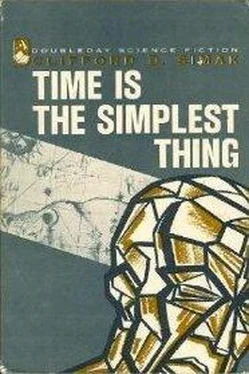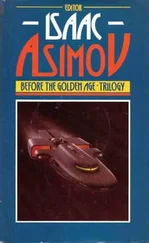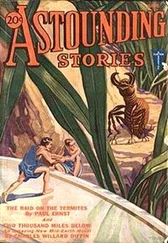Time is the Simplest Thing
by Clifford Simak
Finally there came a time when man was ready to admit that he was barred from space. He had first suspected it in that day when Van Allen found the radiation belts that encircled Earth, and the men at Minnesota used balloons to trap the solar protons. But Man had dreamed so long that even in the face of this he could not forsake the dream without giving it a try.
So he went ahead and tried — and he kept on trying even after astronauts had died to prove he couldn’t do it. Man was too frail for space. He died too easily. He died either of the primary radiations hurled out by the sun or of the secondaries to which the metal of his ship gave birth.
At length Man knew the dream had failed and there was a bitterness and a disillusion in looking at the stars, for the stars were farther now than they had ever been.
After many years, after great thundering in the sky, after a hundred million heartbreaks, Man finally gave up.
It was just as well he did.
There was a better way.
Shepherd Blaine sensed that he was in some sort of house, or, if not a house exactly, in something’s dwelling place. For there was an orderliness and a sense of proportion and of form which did not occur in nature, even in an alien nature on the planet of an unknown star far removed from Earth.
His treads left no tracks upon the floor as they had left tracks upon the sand dunes before he had come upon this dwelling place, if that was what it was. The wind was a whisper only as compared with the howling of the desert storm through which he’d forged for hours.
The floor was hard and smooth and of a bright blue color and very easy for him to roll along. There were forms scattered here and there that might have been furniture or equipment or artifacts of some aesthetic value and they all were blue as well and the shape of them was not the wild, haphazard shape of a surface carved by wind or sun or weather, but the clean-cut lines, straight or curved as they might be, of functional apparatus.
And yet the stars still shone and the distant sun was there, dim as it might be, and so this place he had stumbled on was certainly no enclosure.
Blaine moved forward slowly with all his sensors out, turned up to full capacity, and the sense of house persisted and, a little after that, the sense of life as well.
He felt a thin thread of excitement mount inside himself. For it was not often that one found life at all. It was a memorable occasion when one found intelligence. And here, from the smoothness of the bright blue floor, from these artifacts, was intelligence.
His pace slowed to a crawl, his treads whispering on the floor, his sensors out and working, and the whirring of the tape that sucked up sight and sound and shape and smell and form, recording temperature and time and magnetics and all the other phenomena which existed on this planet.
Far off he saw the life — the thing that sprawled limply on the floor, as a lazy man might sprawl, not doing anything, not expecting to do anything, but just lying there.
Blaine moved toward it, still keeping his slow pace, and the sensors gathered in the knowledge of this sprawling life and the recorders sucked it up.
It was pink; an exciting pink, not a disgusting pink as pink so often can be, not a washed-out pink, nor an anatomical pink, but a very pretty pink, the kind of pink the little girl next door might wear at her seventh birthday party.
It was looking at him — maybe not with eyes — but it was looking at him. It was aware of him. And it was not afraid.
Finally he reached it. He came up to within six feet of it and there he stopped and waited.
It was a fairly massive thing, twelve feet high or so in the middle of it, and it sprawled across an area twenty feet or more in diameter. It towered above the smallness of the machine that happened to be Blaine, but there was no menace in it. Nor a friendliness. There was nothing yet. It was just a lump.
And this was the tough part of it, Blaine reminded himself. This was the moment when you could make or break. The move that he made now might set the pattern for all his future relationship with this thing he faced.
So he stayed perfectly still and did not a single thing. The sensors pulled back in and barely kept alive, the tape scarcely moved at all.
And it was tough to wait, for he was running out of time. There was very little left.
Then he sensed the flutter, picked up by the sophisticated electronic innards of the machine which for the moment was his body; the flutter of the being that sprawled pinkly on the floor — the flutter of a thought half-formed, the beginning of communication, the breaking of the ice.
Blaine tensed, fighting down the elation that surged inside of him. For it was foolish to become elated yet — there was no certain indication of telepathic power. Although the flutter had the feeling of it, a certain connotation . . .
Hang on, he told himself, hang on!
Hold onto that time!
Just thirty seconds left!
The flutter stirred again, louder and sharper now, as if the creature squatting there before him had cleared its mental throat before attempting speech.
It was seldom that one contacted a telepathic creature. Other abilities and traits and idiosyncrasies that made telepathy seem a pallid thing were not at all uncommon, but only rarely did they prove as useful as the plain, old-fashioned telepathic art.
And the creature spoke.
Hi, pal, it said. I trade with you my mind.
Blaine’s mind screamed soundlessly in outraged surprise that came very close to panic. For, suddenly, without warning, he was a double thing — himself and this other creature. For one chaotic instant he saw as the creature saw, felt as the creature felt, knew what the creature knew. And in that same instant he was likewise Shepherd Blaine, Fishhook explorer, a mind from out of Earth and very far from home.
And in that same instant, as well, his time clicked to an end.
There was a sense of rushing, as if space itself might be thundering past at a fantastic rate of speed. Shepherd Blaine, protesting, was jerked across five thousand light years into one specific spot in northern Mexico.
He crawled upward from the well of darkness into which he had been plunged, groping his way with a blind persistence that was almost driven instinct. And he knew where he was — he was sure he knew — but he could not grasp the knowledge. He had been in this well before, many times before, and it was familiar to him, but there was a strangeness now that had never been before.
It was himself, he knew, in which the strangeness lay — almost as if he were another, as if he were only half himself, and the other half of him were tenanted by an unknown being that was backed against a wall and spat in overriding fear and mewled in loneliness.
He clawed his way upward from the well, and his mind fought in frantic urgency against the mewling strangeness in him even as he sensed that it was no use to fight, that the strangeness was a thing that had come to live with him and be a part of him so long as he existed.
He rested for a moment from the climbing and tried to sort out himself, but he was too many things and in too many places and it was utterly confusing. He was a human being (whatever that might be) and he was a scurrying machine and he was an alien Pinkness sprawling on a bright blue floor and he was a mindlessness that fell through aeons of screaming time which finally figured out, when one nailed down the mathematics of it, to the fraction of a second.
He crawled out of the well, and the blackness went away and there was soft light. He was lying flat upon his back and he finally was home and he felt the old, old thankfulness that he’d made it once again.
Читать дальше








